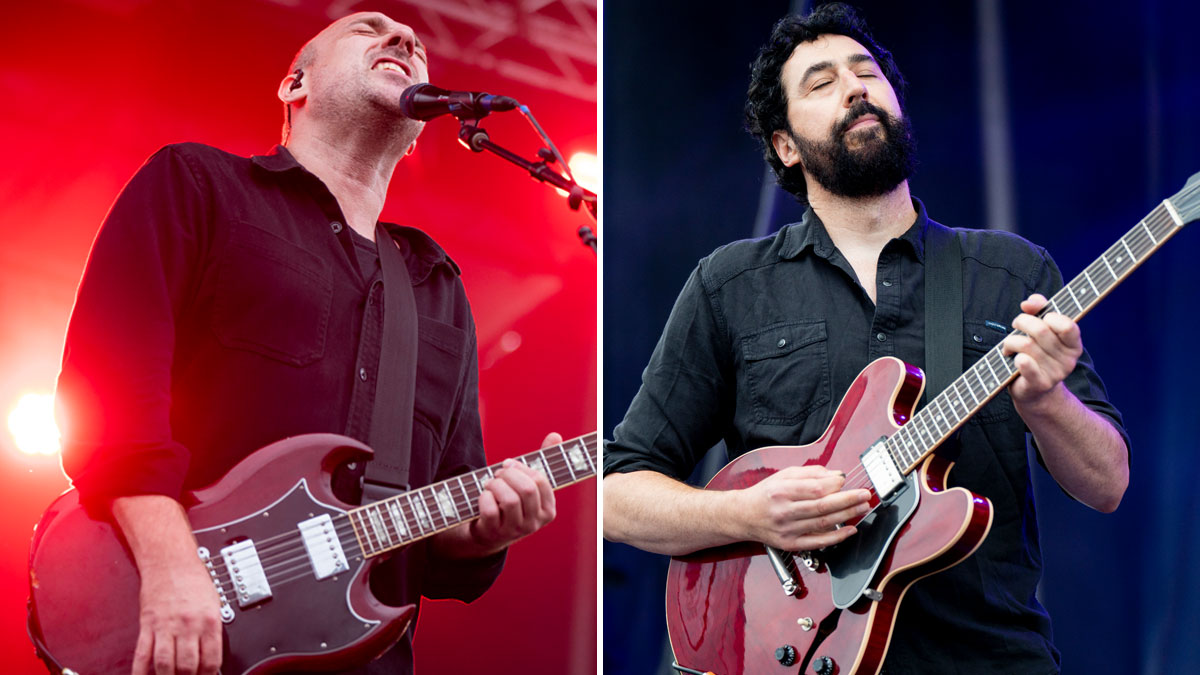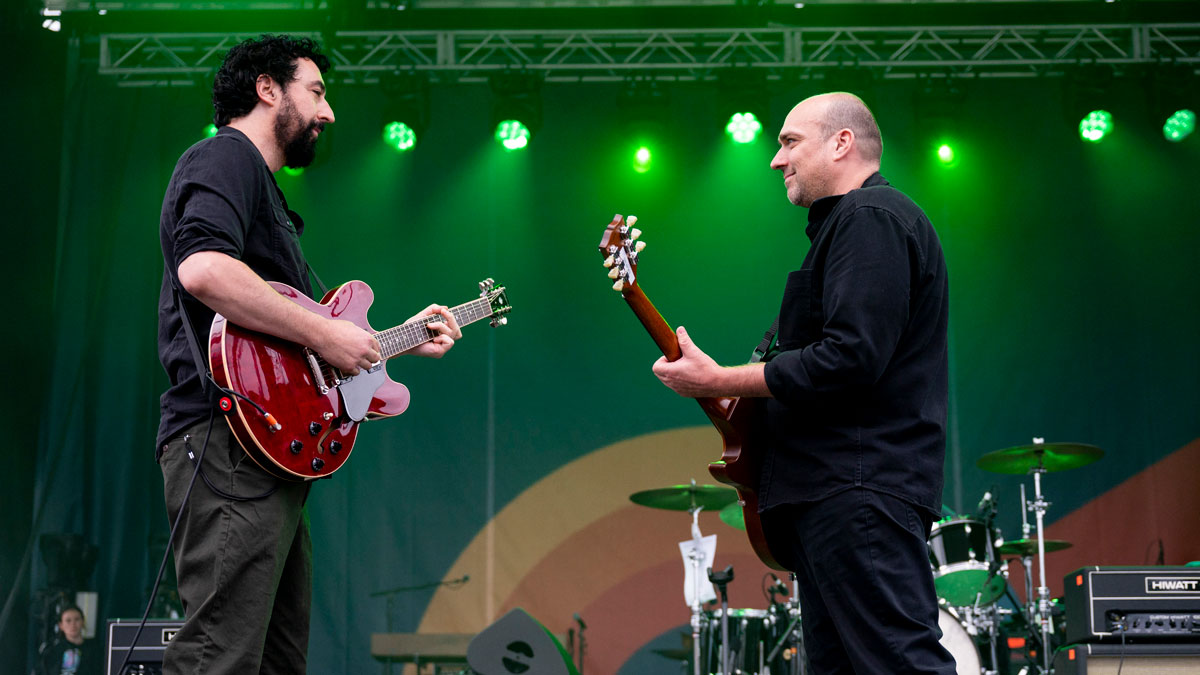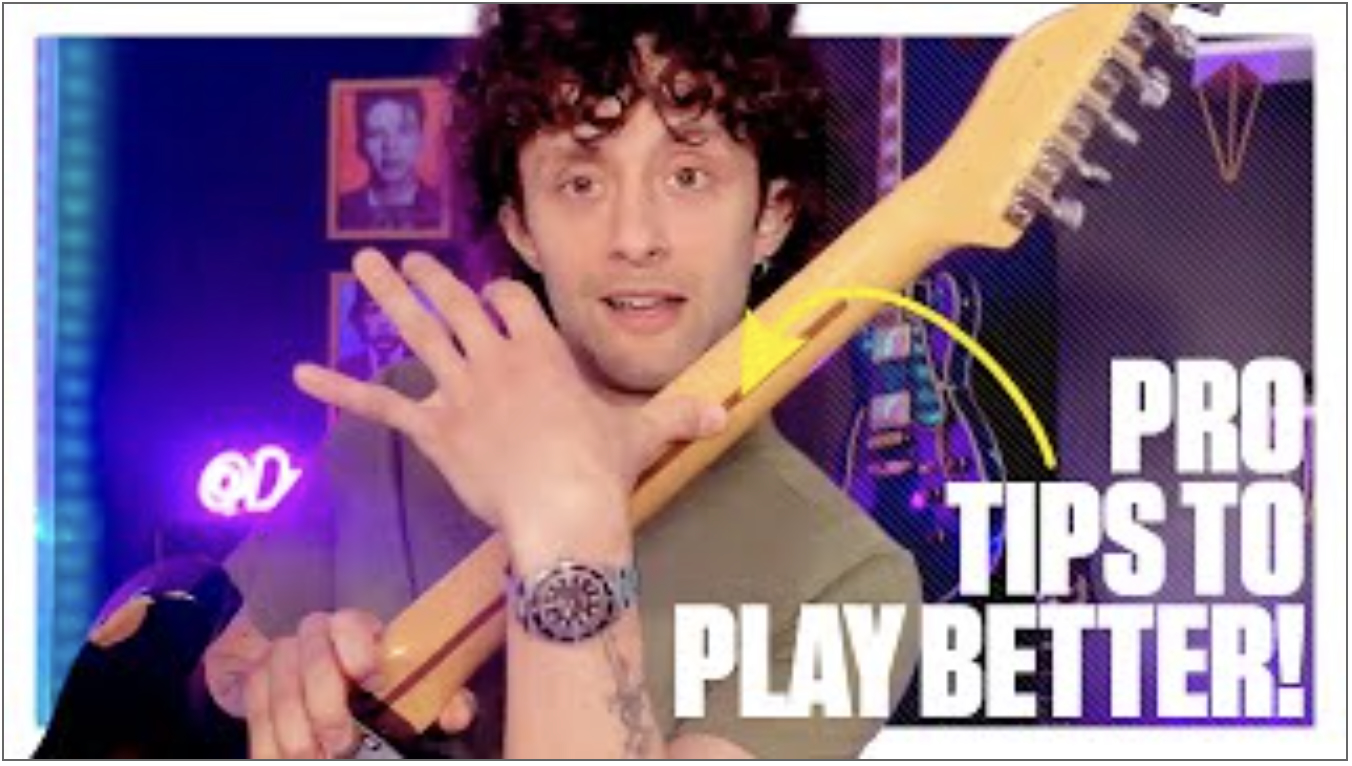“We had just started playing guitar when we wrote Diary. The alchemy came from us learning to play together”: How Sunny Day Real Estate broke rhythm and lead guitar rules to make their influential emo opus – and what’s next for their reunion
The Seattle post-hardcore outfit paved the way for what we now know as emo back in the ’90s. Now they’re back for a run of dates… and maybe more. Gibson devotees Jeremy Enigk and Dan Hoerner discuss their legacy, what new music would sound like and why a lack of tuner pedals made their early shows “f**king excruciating”

Though they're often lumped in with the deluge of Seattle-based bands from the mid-'90s, a certain je ne sais quoi set Sunny Day Real Estate apart.
Maybe it was the unknowingly complex compositions from their 1994 debut, Diary, and its 1995 follow-up, Sunny Day Real Estate (aka Pink). Or perhaps it was how later albums like 1998's How It Feels to Be Something On and 2000's The Rising Tide pushed alt-rock boundaries.
It's hard to tell, but Jeremy Enigk has an idea: "When we were coming up, emo was often lumped in with being vegan and straight edge, he tells Guitar World. "The same type of crowd that tended to wear these backpacks during the show and be emotional [laughs]."
He continues, "So when people would call us 'emo,' we were offended as that wasn't what we were. There's nothing wrong with being straight edge; it's good for your brain, but it's not what we were, and we took it as an insult. But over the years, we've had many different phases, which I've learned to accept and even embrace. It's an honor and a trophy these days."
Co-guitarist Dan Hoerner has nothing but appreciation, saying, "To Jeremy's point, when I look at the pantheon of bands that are considered 'emo,' who are considered all-time greats, I'm so stoked to be included in that group."
He adds, "I think many things that start as disses or slang that people mock end up ironically being the things you embrace. And then, it's not ironic anymore. That happens so often with language, and emo is no exception."
By now, fans should be aware that Enigk, Hoerner, and drummer William Goldsmith have saddled up again. However, bassist Nate Mendel is not along for the ride – he's tied up with Foo Fighters – so Chris Jordan is stepping in on four-string duties.
Get The Pick Newsletter
All the latest guitar news, interviews, lessons, reviews, deals and more, direct to your inbox!
For now, at least, the plan is to tour, get comfortable, and see what happens. But naturally, fans want to know about new material.
"That's yet to be seen," Enigk says. "I do have a fear wall of being able to rise to the level that we once were able to. But I know the talent level, and if we were to approach new music again, I think we would do well. No-one's gonna let mediocrity slip in."
"When we write songs, it's fun," Hoerner adds. "And we write many songs – many of them are super-shitty [laughs]. I don't mind writing a bunch of shitty songs; I know that not all of them will work out. Joy is the ingredient for it to work."
What are your observations of the scene now compared to when you were coming up?
Much of our success was due to Seattle and the resurgence of rock being popular because of bands like Nirvana
Jeremy Enigk
Enigk: "That's a good question… I don't really know, to be honest. I guess the pool is much bigger because of the internet. There are so many bands out there now that I can't keep up. Truthfully, I'm completely out of touch. I think that Dan is a bit more plugged in when it comes to that stuff."
Hoerner: "I'm not as plugged in as you'd think, even though I own a music venue [The Big Dipper in Spokane, WA]. I have a lot of bands coming through and playing, but I don't know if the same thing is happening like our scene. You used to pick some dirty spot in a crappy area and play rock shows. And then, a bunch of people would gather and play shows, too. But I don't know if bands are tapping into things like that anymore. I guess it's happening somewhere, but I don't know where."
If Sunny Day Real Estate were coming up now, would you be as successful?
Enigk: "It's hard to tell, but one of our advantages was that we were from Seattle, and Sub Pop was right there. All eyes were on Seattle because of grunge, making it easier if you were somewhat decent. Marco Collons, a radio DJ, also fell in love with us, putting us in regular radio rotation on 107.7 KNDD in Seattle. Much of our success was due to Seattle and the resurgence of rock being popular because of bands like Nirvana."
You touched a lot of people with Diary. Did you grasp that album's impact back then?
Enigk: "We were making music that spoke the language from our hearts. The goal was to go into the rehearsal room and have an experience that lifted us out of our reality, lifted our hearts, and made us feel like we could fly. That still happens when we get into rehearsal. I feel that amazing exhilaration of feeling like a wizard doing some crazy alchemy.
"So, I think that's where we started, and I don't want to speak for Dan, but I will say that he had observations early on like, 'Wow, this is really good.' I think Dan did have a vision and could see it."
Right now, we're relearning some old songs and listening to the actual, isolated guitar tracks on their own, and they sound so absurd
Jeremy Enigk
Hoerner: "Like Jeremy said, we wanted to create as honest and authentic music as possible. And we wanted to have as much of what we loved as humanly possible. I don't know… it still means a lot to hear that it touched many people. I'm stoked to hear from people that Diary is timeless."
What was the division of labor between you like back then?
Enigk: "Well, it's funny because right now, we're relearning some old songs and listening to the actual, isolated guitar tracks on their own, and they sound so absurd [laughs]. They sound so immature, showing that we had just started learning to play guitar when we wrote Diary. But when we put it together, the alchemy came from Dan and I learning to play together to make a complete thing happen. We learned to bounce off each other; I'd play one rhythm, and Dan would counter it to fill my empty space. And I'd do the same with his lines. It was effortless."
Hoerner: "That's well said. I would add that the whole 'lead' and 'rhythm' thing is arbitrary. We didn't make a conscious choice to say who would do what. If you isolate the lines, we both play lead and rhythm, which is an exciting and unique way of playing. I feel like half a guitar player, but when I'm doing Sunday Day Real Estate, I get to do this thing with lead elements, but it's about supporting the melody and the interplay with Jeremy."

You can hear a rise in musicianship on How It Feels to Be Something On. Do you feel that's the band's definitive musical statement?
Hoerner: "Man, that's a good question. For me, it's shifted over time. But I love How It Feels to Be Something On. There's a lot of soul, and some of the themes and execution are as good as we hoped. But there's also Diary, which, of course, I love. So, sometimes my favorite is Diary, and sometimes it's something from Pink [Sunny Day Real Estate]. All our albums are part of a story; you've got the beginning, a climax, an end, and the epilogue. But it's weird because we're still in it, so it's hard for me to distinguish now."
Enigk: "The listener would probably go with Diary. But I don't think this band can be defined by one record because each has its own journey and personality. They're all very extreme and different. I was never a huge fan of The Rising Tide for years after we released it, but one day, I put on headphones and listened to the entire record; I had to keep myself from crying. There are moments when it's so beautiful, and that's when it became my definitive record. It feels like our masterpiece – lush, full of textures, and probably before its time."
What guitars and gear are you using, and how has it changed since the '90s?
Hoerner: "Back in the day, I kept it simple: I used my Gibson Les Paul Custom, a Marshall half-stack, and my Ernie Ball volume pedal. That's pretty much it. With the Ernie Ball pedal, I used to do this trick where I'd take a stack of pennies and tape it to the bottom where you'd depress the lever. That would be the clean sound where the pennies would stop before it went down and got too loud. And then, if I did push it totally down, that was the loud sound."
"That got me through Diary and Pink, and then I expanded by adding a Gibson ES-335, but I still drove a clean sound and didn't use many effects. I eventually added a delay and some reverb. It's similar now, but I'm using a Victory Super Kraken with a 212 cab and a Victory Duchess V40 Deluxe. And I've got a Strymon pedal, a bunch of other shit I don't even understand, and a great tuner. I have a great story about tuning our instruments when we first started…"
Oh, do tell!
We found that there were these pedals that you step on that turned everything off, and you tune your guitar without making a f**king racket like cats in a bag
Dan Hoerner
Hoerner: "It's hilarious, but we knew nothing about tuning pedals when we started. So, the way Jeremy and I tuned our guitars was by having Nate make a harmonic on his D string, and then we'd make harmonics together to the sound of Nate's D string on stage in front of everyone. It was fucking excruciating.
"I remember playing a show and being told, 'You guys cannot tune onstage anymore. You're amazing, but you have to get tuners.' So, we found that there were these pedals that you step on that turned everything off, and you tune your guitar without making a fucking racket like cats in a bag [laughs]. But now, I've got this amazing Peterson Strobe Tuner and a Boss volume pedal [FV-500], so I don't put pennies under there anymore as it's got its own little limiter on the side."
And how about you, Jeremy?
Enigk: "I'm going with the same Hiwatt Custom 100 amp I've used since [post-Sunny Day Real Estate project] The Fire Theft days. I've never needed to upgrade. But back in the day, like Dan, I had a volume pedal and an old Ampeg; it was really simple. But now, I'm using a Line 6 green pedal [DL4 MkII], which has delay and loops, and I use the Box of Rock by Z.Vex for gain and to give me a little oomph. For distortion, I use Greedtone stuff and another heavier-sounding one by Palomar [Sound] called The Coyote. I also use that same Peterson pedal for tuning that Dan does.
"For guitars, I have my old Gibson SG, which I used on all the old records. But I've graduated to a new SG Custom, which sounds substantially better. But I love my old SG for nostalgia, even if the new one sounds better.
"The last thing that comes to mind is my Gibson Les Paul Elegant, probably my favorite-sounding guitar. I use it for songs in E tuning and sometimes standard D. Aside from a semi-hollow guitar and a Les Paul Goldtop, that's it. We're trying to use stuff that won't sound far from the band's classic sound."
- Sunny Day Real Estate play select show across the US in October and November – see sunnyday.realestate for full dates.
Andrew Daly is an iced-coffee-addicted, oddball Telecaster-playing, alfredo pasta-loving journalist from Long Island, NY, who, in addition to being a contributing writer for Guitar World, scribes for Bass Player, Guitar Player, Guitarist, and MusicRadar. Andrew has interviewed favorites like Ace Frehley, Johnny Marr, Vito Bratta, Bruce Kulick, Joe Perry, Brad Whitford, Tom Morello, Rich Robinson, and Paul Stanley, while his all-time favorite (rhythm player), Keith Richards, continues to elude him.
“Such a rare piece”: Dave Navarro has chosen the guitar he’s using to record his first post-Jane’s Addiction material – and it’s a historic build
“The best guitar player I ever heard”: Nashville guitar extraordinaire Mac Gayden – who worked with Bob Dylan, Elvis, Linda Ronstadt and Simon & Garfunkel – dies at 83





![[from left] George Harrison with his Gretsch Country Gentleman, Norman Harris of Norman's Rare Guitars holds a gold-top Les Paul, John Fogerty with his legendary 1969 Rickenbacker](https://cdn.mos.cms.futurecdn.net/TuH3nuhn9etqjdn5sy4ntW.jpg)





